- Home
- Sebastian Faulks
On Green Dolphin Street Page 3
On Green Dolphin Street Read online
Page 3
Eventually, David put down his pencil and came over to where she sat.
“Can I rearrange you a little?” he said.
He lifted her elbow and resettled it.
“This isn’t working at all,” he said.
“You look so worried.”
“I can’t concentrate. You know why.”
“Do I?” It was the first time Mary had seen herself through the eyes of a man; and this intelligent, worldly person seemed quite disabled, reduced to helplessness, by some power of hers alone. Seeing this, she felt an exquisite trepidation.
David moved her arm again, this time allowing his hand to touch her breast. His voice was clotted. “You’re very beautiful, you know.”
“I’m not.”
“You are, you are.” He ran his hand over her abdomen, down between her legs while his other hand stroked her forehead. “With your black gypsy hair.”
“It’s not black.”
“Almost.”
His hand ran slickly through her, then settled to a point of sensation that made her close her eyes as she felt her spine grow numb. The last coherent thought she had was that she still had not kissed him.
Later, although they had not actually made love, Mary felt ashamed of how easily she seemed to have found her way into this new experience; she felt awkward as she fumbled with the fastenings of her clothes behind the screen. By the next time she saw David, however, the natural poise of her temperament had reasserted itself: they went to the National Gallery and then for lunch in a café; she enjoyed being with him and was, in the end, disappointed that he did not seem to feel himself entitled to repeat his forward behavior. She wondered if he really valued her, or if perhaps she had accommodated him too readily. She wanted to seduce him properly so that he would be forced to confront this new reality, whatever it turned out to be.
David needed no persuading, only an opportunity, which came the following weekend after a party given by a colleague. They took a taxi back to David’s lodgings, slipped their shoes off at the door and crept upstairs. He put a penny in the gas meter, lit the fire and then, when the blackout was up, a candle, by whose orange flame she allowed him to undress her, piece by piece, as he knelt before her on the threadbare hearth rug. As he dealt with her jacket and skirt, he was still talking about the landlady, Mrs. Carman, with her bilious temper and bags full of odd-smelling possessions; when he pulled down her satin slip, he became more serious. How solemn his face then became, Mary could not say, as, acting on some childish impulse, she had closed her eyes in the hope of becoming invisible.
It was not all that she had hoped, when finally he lay on top of her, but it was enough for her to feel changed by it, in some way emancipated, bolder and brighter when she looked back on it the following day. David told her it was an adventure for him as well, something he had never tried before, though she thought he said that only to reassure her: how else could he so knowingly have touched her when she lay there naked as his model?
After Mary joined the WAAF, she was trained at first in London and continued to meet David when she was allowed. She had never had a boyfriend before and balked at the word when her father used it, but when her embarrassment had subsided she was forced to concede to herself that this was what he was. The trouble was she had never felt the things that girls, according to friends and books she read, were meant to feel. She thought that perhaps her mother and father had so enveloped her in love that she had none to spare, or that any man would somehow have to become a part of her family, like a brother, before she could love him in return. This seemed undesirable, and for the first time in her life she fretted at her parents’ tight embrace.
David’s second application to join the army was successful, and he was dispatched for preliminary training before taking a commission in a Shropshire regiment; Mary was posted by the WAAF to Norfolk, and their affair became one of leave-time assignations and weekly letters. One winter night, after a separation of six weeks, she arrived at Trinity Church Square only a few minutes after David himself. He looked unsoldierly in uniform, plump and vulnerable. He poured her a drink and sat on the bed in the corner, loosening his khaki tie, searching in the pocket of his tunic for cigarettes.
Sitting cross-legged on the arm of his sofa, Mary, half swallowed by her air-force blue serge, her anxious dark eyes peering across at him, was struck by a strange sensation. The light by which he was lit, only a shaded bulb suspended on a flex from the ceiling, seemed to cast a glow about his head and shoulders, like an aura. His movements seemed to have slowed, as though he had moved into a separate world; when he raised his face from the flare of the match, it was radiant. For the first time, the contradictions of his comic face and serious manner were resolved: his expression, when he met her eye, was taut with tenderness.
She walked to him in a daze. She sat on his knee and put her arms about his neck. She buried her face against his shirt. She heard his voice at a distance going through a list of endearments and she wished that he could find more, that his voice would carry on speaking. A transcendence was happening in her, so light that she could not think what name to call it by; all she could tell when at last she pulled back her head from his chest and looked him in the eyes was that something was changed: she had tasted a power of emotion, and all her experiences from that moment would be seen in its light.
For seven months they saw each other as often as they could; then David’s battalion was sent to North Africa, from where he wrote her airmail letters, the brittle paper crushed beneath his desperate endearments. Mary lived in a converted school and bicycled to the airfield where she was instructed in how to track the movements of enemy aircraft; but her nights before the radar screen and her mornings in the dormitory were filled with lightness, a sense that they were in some respect provisional, because what mattered to her was elsewhere: not in Norfolk, not in the German bomber stations of Norway, nor even in the deserts of Tunisia, but in a separate, more fully realized existence.
She watched a point of light on the circumference of the screen and saw the straight beam sweep and catch on it: bright representations, radiant particles, and meaning altogether elsewhere.
A telephone call from her mother in London informed her that David had been killed in action. His company had been on the wing of a British advance that was counterattacked by the Germans; David had been buried on the battlefield, but in the wake of the successful British action would be transferred to a Commonwealth war cemetery. Mary worried how he might have managed if he had lost his glasses at some stage in the fighting; she visualized him on a sand dune, swiveling round in blind desperation with sweat running down his cheeks, as she had seen him on the squash court, then blundering into a German gun.
She was able to think with clarity. When years had passed she would meet other men; the natural affability of her temperament would not change: but David was her one, her self, and therefore that aspect of her life was over. As a girl she had viewed her future as infinite and her expectations as limitless; but over them now she felt something slide and close.
Chapter 2
In the morning Charlie van der Linden emerged from Number 1064, his hair still damp from the shower and with blood on the collar of his shirt from his peremptory shave. He felt too sick to have breakfast, but a taxi that Mary had called while he dressed was waiting for him; his own office was still in a hotel on Connecticut Avenue where his department was based until the new Embassy building was complete. Morning Prayers, however, the formal meeting that began each day, took place in the almost-finished premises on Massachusetts Avenue because it had a secure meeting room. The Ambassador was out of town, but the Minister, who would chair it, liked to draw on what counselors had read to save him from the trouble of studying all the papers himself. As Charlie slumped back against the taxi’s leather seat, he desperately scanned the papers to see what questions might be directed his way.
He pulled the remains of a crushed pack of cigarettes from his jacket and searc
hed for a match. The trouble with Washington was that it was drastically short of drugstores, delis, bars or anywhere that he could get what he needed to start his day. One street of the inner suburb gave way to the next without so much as a general store or a laundromat to service the residential miles. He told the driver to divert to one of the big hotels, where, while the cab waited, he ran into the overheated coffee shop. He hated American coffee; it was always dusty, boiling hot and lacked the necessary caffeine. He drank as much as he could from a heated mug, managed half a Danish pastry, took two books of matches and left some coins on the bar.
By the time he reached the Embassy, he had flicked through the Post and The New York Times, but Morning Prayers were already under way. On hard chairs around the walls sat numerous grave-looking men, the economic and Chancery first secretaries and the usual naval and military analysts. Charlie mumbled some apologies as he took his vacant place at the table.
“Good morning, Charlie. We were talking about Richard Nixon. Do you fancy a trip to California?”
“Not particularly, no.”
Charlie was feeling the exhilaration of a hangover that had not settled. A thin film had been shaved from his irises; the molecular movement of the surrounding world had increased in agitation by about half its normal speed; he could feel a slight flush in his neck and jaw, but the headache was still a distant threat. He felt bold, carefree, as he shakily rode the chemical balances of his system: he was essentially, he admitted to himself, still drunk.
Edward Renshaw glanced at Charlie, his eyes dilating for an instant as he took in the bloodstained collar. His own capacity for recovery was legendary, and he looked as pure and dedicated as the day he had first arrived in Whitehall. He pushed back his hair. “It’s very difficult to tell at this stage, of course,” he said, clearly referring back to what was being discussed before Charlie arrived. “But our analysis still points to Nixon-Kennedy in November and to a narrow win for Nixon. That’s the assumption we’re working on.”
“We’ll see,” said the Minister, before beginning to analyze what a Republican government under Nixon might mean.
Charlie looked out of the window. He needed to prepare an excuse for not going to California. He dreaded the thought of having to ingratiate himself with Richard Nixon’s staff, buying drinks and lunches for various small-town lawyers who had slapped Joe McCarthy on the back, inquiring about their plans for foreign policy, as though Nixon had any policy at all beyond getting himself elected. What was decisive for Charlie, however, was not his distaste for the work itself, but the fact that he found himself unable to fly without having swallowed three sedatives and half a bottle of scotch.
He also wanted to be in Washington to keep an eye on the stock market, to consult brokers in London and New York; it was difficult to stay in touch when you were in Santa Barbara, eight hours behind the start of dealing in the City. Charlie’s portfolio of shares was now worth less than half its value three years earlier; he had borrowed more money to invest, but although he twice changed his broker, his inexplicable run, his own private bear, had continued.
Charlie held his face in his hands and rubbed his eyes. Sometimes he wished he had not had children. It was not that he didn’t love them; occasionally when he went into their rooms at night and saw them sleeping, he felt his stomach tighten as a feeling in him yearned protectively toward them. In the sober daylight, however, he found they were expensive, wearisome and always complicating the arrangements. Before, he had been true to some ideal he had developed of the way a man should live, without favor or obligation to anyone but himself; now he was preparing to persuade some adviser on the Nixon payroll that there was a coincidence of interest in the way they saw the Communist threat. Charlie had once been good at this kind of thing; his social ease and humor, coupled with degrees and honors he had acquired with the minimum of endeavor at ancient English and American universities, had fitted him in the eyes of his superiors for rapid advancement; they remained unaware of his difficulties, and his occasionally erratic behavior was overlooked in the generally hedonistic atmosphere or accepted as the price of his talents.
After the meeting, he took a taxi to the hotel where his temporary office was on the first floor of the building. It was a converted bedroom suite, in the outer room of which, the former lounge, sat his secretary, a tidy American woman in a gray flannel skirt and black loafers.
“Coffee, Mr. van der Linden?”
“Thank you, Benton.” He called her what everyone else did; no one seemed to think that Patty, her first name, did justice to her severe efficiency.
“I read the Russians are going to put a man in space,” she said as she placed the cup on his desk.
“Really? Make me some appointments, Benton, get me busy. By lunchtime I don’t want to be free to travel.”
“Right away, Mr. van der Linden. Any news about when we’ll be moving into the new Embassy?”
“Can’t tell you that, Benton. Classified.”
Benton’s first job had been working with the British military in Washington in the last year of the war, which had given her security clearance at a level exceptional for a nonnative in the Embassy. Charlie liked to pretend that this had been a serious mistake.
Benton paused with her hand on the telephone. “By the way,” she said, “did you hear they invented a new cocktail? It’s called the Sputnik.”
“Okay, what is it?”
“One part vodka and three parts sour grapes.”
“I like it. I’m surprised at a good American like you, though, telling such unpatriotic jokes. You might find yourself the subject of a hearing.”
“Uh-huh.”
“I heard one, too,” said Charlie. “You know Eisenhower likes to read science fiction. What does Khrushchev read?”
“I already heard that one,” said Benton, as she settled at the desk and began to dial. “Science fact.”
Charlie gazed out at the frosted sycamore trees on the avenue. The people of the United States appeared to be in a condition of what his psychoanalyst in Bethesda called “free-floating anxiety,” expecting, for all their material comforts, to be overwhelmed at any moment by the superior technical weaponry of the Russian enemy or undermined from within by the machinations of its agents. They appeared to be losing the Cold War, and were always aware of that awkward fact. He knew one American family who had relocated to Montana to be beyond the range of Soviet missiles, but most seemed to have reached a compromise with their anxieties: to still the beating heart, they went hiking in the Blue Ridge Mountains, they experimented with European wines, they planned holidays with friends and affairs with the same friends’ spouses, they listened to show tunes and jazz, they bought larger cars with bigger tail fins. They opened charge accounts, bought new seasonal wardrobes and indulged their children in Hula Hoops and Lincoln Logs.
Charlie sighed and picked up the unopened mail on his desk. His stomach lining felt as though it had been scoured with wire wool.
Frank Renzo did not come downstairs until eleven o’clock. He found Mary on the telephone in the kitchen, explaining to Kelly Eberstadt that she might be late for their lunch appointment because of her sleeping visitor.
She hung up quickly. “Did you sleep all right? How’s your hand?”
Frank shifted around the room uneasily. “I had no idea what time it was. Did I keep you from doing anything?”
“No. No, I was just doing a little work and then … I’m going out in about half an hour. Can I get you some breakfast?”
Frank sat at the table while she made coffee. He leaned back in the chair and looked through the paper. He opened it only a few inches and held it at arm’s length, as though worried that he might be blinded by the glare of its contents.
“What are these?” he said, picking up a pile of woven nametapes.
“They’re for the children’s clothes. We’re sending them to boarding school in England.”
Mary turned back to the electric percolator. She was wear
ing a shirt-waisted catalog dress just back from the cleaner; it was part of the family’s agreed economy measures that she should cut back that year on new clothes, though she felt a little self-conscious about it as Frank scrutinized her from behind.
“You don’t sound too happy about that,” he said. “The school thing.”
“I’m not really.” Mary put the cups on the table and sat down. “It’s another economy measure. It’s one of the perks of the job that when you go abroad your children get subsidized schooling in England. They’ve been too young until now, and anyway I wanted to keep them here. But Charlie says we can’t afford the private schools here so they have to go back home.”
“You’ll miss them.”
“I think I will.”
“You could send them to the public schools here.”
“We could …” Mary felt uneasy, as though she were implying some criticism of American education. In fact, it was Charlie who had been against it: beyond the diplomatic vacuum, he pointed out, Washington was not an easy place.
“But I wouldn’t recommend it.”
“Why?”
“High school I went to in Chicago you just hoped to get out alive at the end of the day. My father made the mistake of settling his family in an all-colored neighborhood. Jesus.” Frank lit a cigarette and folded up the newspaper. “It’s not as if there weren’t enough Italian families in town. There were whole streets you’d think you were in Naples. You been to Chicago?”
“Not yet. But Charlie travels a lot, and when the children have gone off to school I’m hoping to go with him.”
“Nice guy, your husband.”
Mary smiled. “Well, I think so.”
“So do I.” Frank stood up. “I’d better get back to the hotel, get a change of clothes. No taste in music, though. Don’t tell him I said so.”

 Devil May Care
Devil May Care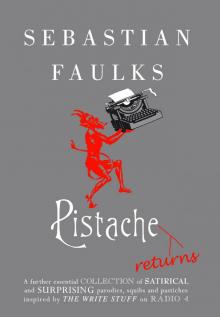 Pistache Returns
Pistache Returns The Girl at the Lion D'Or
The Girl at the Lion D'Or Pistache
Pistache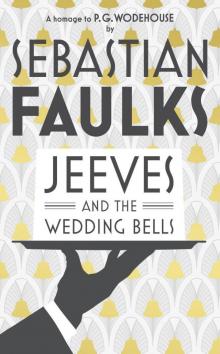 Jeeves and the Wedding Bells
Jeeves and the Wedding Bells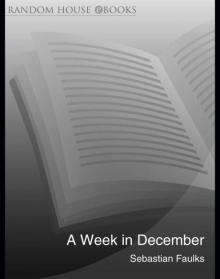 A Week in December
A Week in December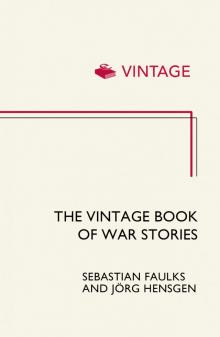 The Vintage Book of War Stories
The Vintage Book of War Stories Engleby
Engleby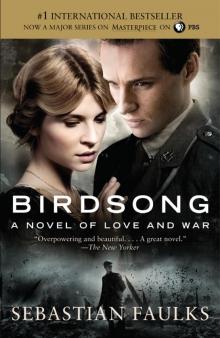 Birdsong
Birdsong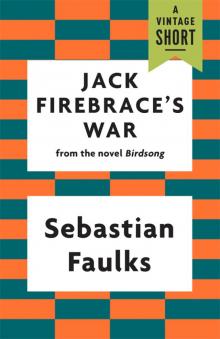 Jack Firebrace's War
Jack Firebrace's War Where My Heart Used to Beat
Where My Heart Used to Beat A Possible Life
A Possible Life The Fatal Englishman: Three Short Lives
The Fatal Englishman: Three Short Lives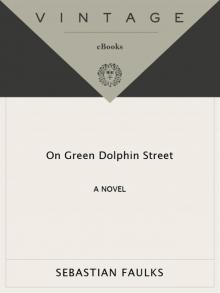 On Green Dolphin Street
On Green Dolphin Street Charlotte Gray
Charlotte Gray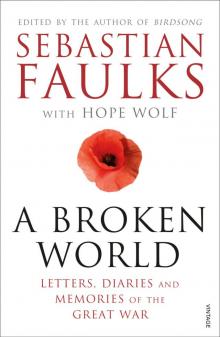 A Broken World: Letters, Diaries and Memories of the Great War
A Broken World: Letters, Diaries and Memories of the Great War Human Traces
Human Traces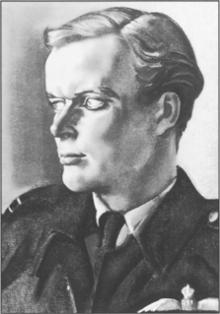 The Fatal Englishman
The Fatal Englishman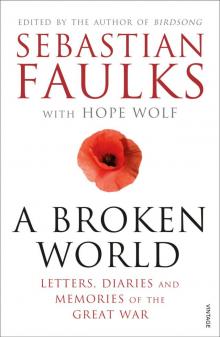 A Broken World
A Broken World Paris Echo
Paris Echo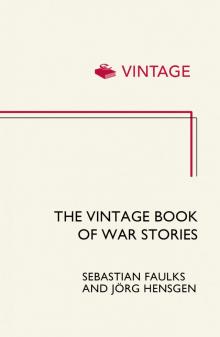 War Stories
War Stories Girl At the Lion d'Or
Girl At the Lion d'Or